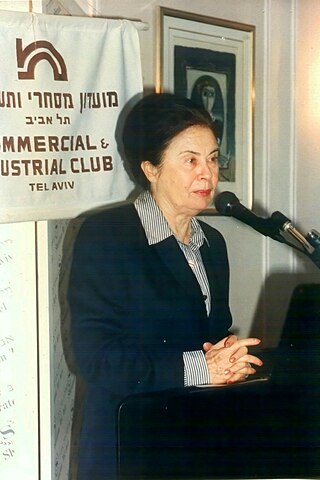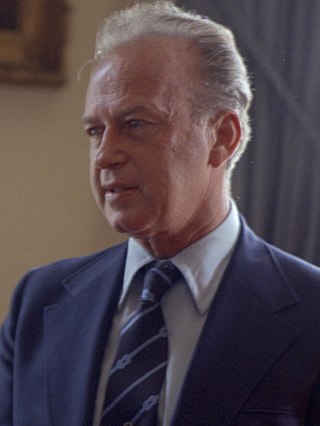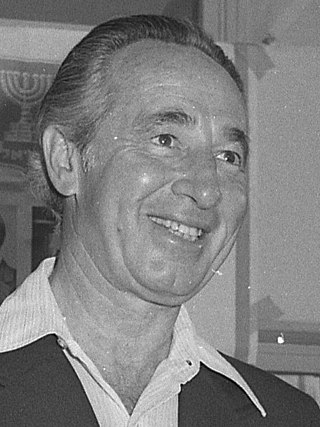
The prime minister of Israel is the head of government and chief executive of the State of Israel.

Yitzhak Rabin was an Israeli politician, statesman and general. He was the fifth Prime Minister of Israel, serving two terms in office, 1974–77, and from 1992 until his assassination in 1995.

Shimon Peres was an Israeli politician who served as the eighth prime minister of Israel from 1984 to 1986 and from 1995 to 1996 and as the ninth president of Israel from 2007 to 2014. He was a member of twelve cabinets and represented five political parties in a political career spanning 70 years. Peres was elected to the Knesset in November 1959 and except for a three-month-long interregnum in early 2006, served as a member of the Knesset continuously until he was elected president in 2007. Serving in the Knesset for 48 years, Peres is the longest serving member in the Knesset's history. At the time of his retirement from politics in 2014, he was the world's oldest head of state and was considered the last link to Israel's founding generation.
Legislative elections were held in Israel on 17 May 1977 to elect the ninth Knesset. For the first time in Israeli political history, the right wing, led by Likud, won a plurality of seats, ending almost 30 years of rule by the left-wing Alignment and its predecessor, Mapai. The dramatic shift in Israeli politics caused by the outcome led to it becoming known as "the revolution", a phrase coined by TV anchor Haim Yavin when he announced the election results live on television with the words "Ladies and gentlemen—a revolution!". The election saw the beginning of a period lasting almost two decades where the left- and right-wing blocs held roughly equal numbers of seats in the Knesset.
The Alignment was the name of two political alliances in Israel, both of which ended their existence by merging into the Israeli Labor Party.
Elections for the 13th Knesset were held in Israel on 23 June 1992. The election resulted in the formation of a Labor government, led by Yitzhak Rabin, helped by the failure of several small right wing parties to pass the electoral threshold. Voter turnout was 77.4%.
General elections were held in Israel on 29 May 1996. For the first time, the prime minister was elected on a separate ballot from the remaining members of the Knesset.

Ora Namir was an Israeli politician and diplomat who served as a member of the Knesset from 1974 until 1996, as well as holding the posts of Minister of the Environment and Minister of Labour and Social Welfare during the 1990s. She later became the country's ambassador to China and Mongolia.

The sixteenth government of Israel was formed by Golda Meir on 10 March 1974, following the December 1973 elections. However, following Meir's resignation as Prime Minister on 11 April, it only remained in office until 3 June, and at just 85 days, was the shortest-lived government in Israeli political history.

The seventeenth government of Israel was formed by Yitzhak Rabin on 3 June 1974, following the resignation of Prime Minister Golda Meir on 11 April and Rabin's election as Labor Party leader on 26 April. It was the first time an Israeli government had been led by a native-born Israeli.
The Israeli Labor Party, commonly known as HaAvoda, is a social democratic and Zionist political party in Israel. The party was established in 1968 by a merger of Mapai, Ahdut HaAvoda, and Rafi. Until 1977, all Israeli prime ministers were affiliated with the Labor movement. The current party leader is Merav Michaeli, who was elected in January 2021.
The 1992 Israeli Labor Party leadership election was held on 20 February 1992 to elect the leader of the Israeli Labor Party. The winner was Yitzhak Rabin, who defeated incumbent Shimon Peres, as well as Yisrael Kessar and Ora Namir. The leadership election was the first in Israeli history to be open to a party's entire membership.

The 1974 Israeli Labor Party leadership election was held on 23 April 1974. It saw the party's central committee elect Yitzhak Rabin to succeed Golda Meir as the party's leader. Rabin defeated Shimon Peres. It was the first of four leadership contests in which Rabin and Peres challenged each other.

The 1980 Israeli Labor Party leadership election was held on 18 December 1980. It saw the delegates to the party's convention reelect Shimon Peres as the party's leader. Peres defeated Yitzhak Rabin.
The 1992 Likud leadership election was held on 20 February 1992 to elect the leader of the Likud party. It saw the members of Likud's Central Committee reelect Yitzhak Shamir, who defeated challenges from David Levy and Ariel Sharon
The 1984 Israeli Labor Party leadership election was held in April 1984. It saw Shimon Peres reelected as the party's leader, being unchallenged.
The 1984 Herut leadership election was held on 12 April 1984 to elect the leader of the Herut party. It saw the members of Herut's Central Committee reelect Yitzhak Shamir, who defeated a challenge from former defense minister Ariel Sharon as well as lawyer Aryeh Chertok.
The April 1977 Israeli Labor Party leadership election was held on 11 April 1977. It saw Defense Minister Shimon Peres elected by the party's central committee by acclamation to replace Yitzhak Rabin as the party's leader, being unchallenged in the vote.
The 1995 Israeli Labor Party leadership election was held on 15 November 1995. It saw the party's Central Committee formally vote to make Shimon Peres the party's leader.
The 2003 Israeli Labor Party leadership election was held on 19 June 2003 to elect the leader of the Israeli Labor Party. It saw the party's Central Committee elect former prime minister and former longtime party leader Shimon Peres as the party's interim leader.









